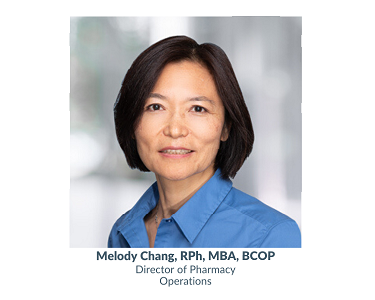Melody Chang, RPh, MBA, BCOP, Publishes Comprehensive Article Examining Medical Marijuana for Cancer Patients
Journal article provides new perspective on controversial issues
Fort Myers, Fla., June 1, 2020 —— Melody Chang, RPh, MBA, BCOP, director of pharmacy operations for Florida Cancer Specialists & Research Institute (FCS), has published an article concerning the ongoing controversy surrounding the treatment of cancer patients with medical marijuana or other cannabinoid-derived products. Available online in the May 19, 2020 issue of Oncology Issues, the journal of the Association of Community Cancer Centers (ACCC), the article conveys the history and timeline of cannabis use for medicinal purposes in the United States, as well as detailed information on the substance’s often-debated, and highly contradictory, legal status.
According to the American Cancer Society (ACS), a few small studies have shown that marijuana can be helpful in treating nausea and vomiting, reducing pain and improving appetite in cancer patients. However, under federal law, marijuana and its cannabinoids (biologically-active components) are listed as Schedule I controlled substances and have not been approved in the treatment of cancer or any other medical condition.

“It is extremely confusing for both patients and providers,” Chang said. “Under Florida’s medical CBD law, for example, patients must be state-qualified in order to possess cannabis strains containing 10% or more of CBD, but not more than 0.8% of THC. However, individual state laws are all different and they directly conflict with federal law that prohibits dispensing medical marijuana, even in states that have passed marijuana legislation.”
In her article, Chang further cited a 2018 study published in the Journal of Clinical Oncology that found a vast majority of oncologists did not feel adequately informed to make recommendations to patients about using medical marijuana. She concluded, “To advance the field, we need to catch up with science, regulation and, very important, education for health care providers, including physicians, pharmacists, nurses and others.”
The full article is attached and can be read here.
